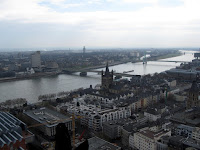 I remember stepping out of terminal A23 at B.R.U. and the feelings of anxiety, nervousness, and excitement I experienced back on January 8th with my arrival into Belgium. I knew not a lick of French (or Dutch for that matter), no clue how to get to my new residence, and was hence forth on my own in nearly every aspect of the next 5 months as an expat. Was I a bit scared? Let the record state that I was not, but in all reality, I was a tad bit uneasy about the whole experience that lay before me.So 'where the heck is Thomas McGuire'?
I remember stepping out of terminal A23 at B.R.U. and the feelings of anxiety, nervousness, and excitement I experienced back on January 8th with my arrival into Belgium. I knew not a lick of French (or Dutch for that matter), no clue how to get to my new residence, and was hence forth on my own in nearly every aspect of the next 5 months as an expat. Was I a bit scared? Let the record state that I was not, but in all reality, I was a tad bit uneasy about the whole experience that lay before me.So 'where the heck is Thomas McGuire'?I'm currently cruising at an altitude of 31,000ft, traveling approximately about 650mph while transcribing my thoughts onto the back of a partially shredded Ryanair boarding pass.
I've been to a lot of cool places and I've met a lot of really interesting people.
I am frequently asked, "Hey Thomas, whats you favorite place to visit? Whats the coolest thing you've seen?" And a variety of other similar questions. Its usually pretty hard for me to come up with answer. Not because I don't have an opinion or a preference but just because Europe is so diverse, it makes comparison across borders very difficult. The E.U. is so diverse in quality, culture, architecture, music, tradition, creativity, and innovation that comparing one to another is essentially impossible.
Regardless, as I am a study abroad student and people will always be inherently curious about what I'm up to, I've created a short evaluation of each of the places I've been as well as what I thought.
BRUSSELS
- The Good: Political and business center of Europe. Most culturally diverse place I've ever been. Large variety of people to meet.
- The Bad: Cold enough to make a polar bear dream of warmer climates. Also, if you don't speak Dutch or French, you're S.O.L.
PARIS
- The Good: Parisians have more style and class than anywhere else I've been. The cuisine, if you can afford it, is a sensory overload and the national monuments are a must see.
- The Bad: Parisians are definitely not looking to make friends. If you're not French, they really want nothing to do with you. Also, very very expensive (for everything). Street gypsies out the wazoo.
NETHERLANDS
- The Good: Intensely rich in history and architectural uniqueness. Offers essentially every pastime you could think of (including some you probably don't want to think of). A very laid back gear towards life and the most welcoming society to outsiders as of yet. Heineken factory is a must see!
- The Bad: Things can get a little weird at times. Enough said.
PRAGUE
- The Good: Very old, great food, great prices.
- The Bad: You'll probably spend too much money since everything is so cheap just to indulge.
BRUGGES
- The Good: Town looks like it was frozen in time during the Medieval ages. Great day trip.
- The Bad: Pricy food. I love food and if you charge me too much for it, I'll dock you favor points. Also, once you walk around the town once, you've seen everything (like I said, great Day trip).
CANARY ISLANDS
- The Good: Warm. Sun. Sand. = European Paradise
- The Bad: Caters to the elderly, and I mean the elderly elderly. Basically the Florida of Europe. Also, you will be haggled by street vendors once every 5 steps you take. Get used to it.
I currently have plans to travel to Dublin, Venice, Switzerland, Luxembourg, and a return trip to Paris with my family during the Easter Holidays. On top of those destinations, I'm sure I'll visit a few more places before its all said and done, further expanding my horizons.
European ClimateOkay, for any of you that have been following this blog even somewhat less than religiously as I'm sure my mother has, you've no doubt picked up on the slight cynicism I harbor with regards to the European climate.
Essentially I'm just not a fan of -5 degree Celsius temperatures mixed with constant snow/rain/sleet.

I grew up in South Carolina, USA; I enjoy my sun and 105 degree Fahrenheit temperatures (maybe not quite that hot, but just anything that gives me an excuse not to wear a shirt). If you h ave future ambitions to travel Europe, I strongly encourage you to book your plans around the Euro addition of the farmer's almanac, if such a thing exists. You'll enjoy the experience much more if you're aren't shaking in your duck books.
Luckily for me the temperatures here in Brussels have begun to cap the freezing point. Although it was snowing upon my return to the E.U. capital, as I look out my window now, its actually quite sunny. By the end of the month temperatures will be hovering around high 40s and low 50s (F) which in comparison will be quite pleasant.
Recap: Sun - a.k.a. Canary Islands = Awesome; Snow with no access to 4x4s and/or ATVs = Miserable.
Life AbroadIf there's one thing this experience has thus far taught me, its accountability. I wouldn't go so far as to say that I was ever a person greatly lacking in such principal but traveling/studying abroad has taken life's education to another level.
My fraternity, Pi Kappa Alpha, focuses heavily on this virtue during the initiation process and with good reason. We teach that being accountable for ones self is above all else, the most important of self maintained ideals. It connects everything together and is the foundation of making a person truly responsible in life.
Such personality behaviors are learned through experience and personal mental reflection. I am of the opinion that far too individuals ever learn, comprehend, or practice being accountable. People are in general (myself included) too quick to point fingers and lay blame elsewhere when in reality taking control of the situation and working with what you've been dealt would essentially be more cohesive.
The high road is rarely the easy road.
Please don't misunderstand me. I am in no way trying to misrepresent myself as an all righteous, egotistical prick. We all have our days and sometimes life just pushes too hard. We find ourselves upset whispering, "Do you feel lucky? Well, do ya, punk?"
At this point I've ranted and raved long enough where you're probably thinking how in the world does any of this relate back to studying abroad?
Being here, being away from friends, family, and all familiarity, it change's a person's perspective. At first I resented it. I wasn't trying to be adaptive, but I soon realized its part of the experience. Everything I do, every action I embark upon, every decision I make - its all on me. Mom and Pops are 4600 miles away and if I ever needed physical help, the most instant action of assistance I would receive would be a crackly 'sorry' voiced via skype. I know that this is probably scaring the bajeezes out of my mother right now, but its true. There is very little anyone can do for me here and that just causes me to undertake that much more personal responsibility.
Personally that sort of knowledge is empowering. And I love it.

I'm making my own decisions, living my own life, and creating my own experiences. No one teaches study abroad students how to go about life outside of their native areas. Its all about trial and error. We figure it out on our own.
I remember experiencing some similar thoughts back when I first started college but being abroad tops that 10:1. The choices I make, for better or for worse, are my own. There's no two ways about it. Ergo, a person must be accountable.
Anyone that knows much about me will concur that I personally am a creature that learns through experience. I prefer hands on as opposed to simply learning the theory. Studying abroad is in all meanings of the phrase, a 'hands on experience'. The situations you find yourself in while abroad, some good some bad, all ultimately teach you something new and give you one more piece to life's puzzle. While I am enrolled in school as well, there is no doubt in my mind that learning I've done while traveling trumps the previous.
This is the type of real world application and experience you take with you for the rest of your life. Its applicable everywhere. Granted, there are still many times when I miss home, but ultimately I feel that coming here was probably one of my best decisions.
I was nervous when I first arrived in Brussels. I had a lot of questions, very few answers, and really no where to turn for help. I'm over half way into my study abroad tenure and have zero regrets about my choice to come here. I am no more certain about what the future holds than when I first arrived; the only difference between now and then is I have 100% confidence in myself that I can take whatever comes my way.
Bring it on life.
All good; all the time,
Thomas
 With the weather warming, the clouds retreating, and the first signs of spring beginning to appear here in Brussels, I find myself shedding layers of clothes and creeping from the depths of the cave my roommates and I out lasted the winter in.
With the weather warming, the clouds retreating, and the first signs of spring beginning to appear here in Brussels, I find myself shedding layers of clothes and creeping from the depths of the cave my roommates and I out lasted the winter in.















